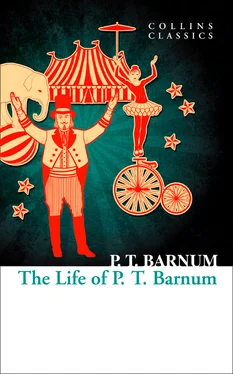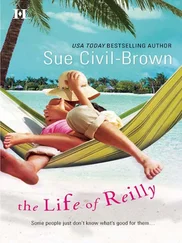The good woman had a son of about my size. I had no particular use for my two pocket handkerchiefs. Her boy could use them, and I gladly accepted her proposal to trade them for four sticks of molasses candy. I had an extra pair of stockings which I was sure I should never need, and they went for five more rolls of molasses candy!
When thus divested of all I possessed, I became resigned to my fate, and, turning my attention to some other source of excitement, I made the acquaintance of a young gentleman from Connecticut. He was about twenty years of age, had been in New York once before, “knew the ropes,” and proposed to show me the city. I gladly accompanied him, and saw many sights that day which astonished me beyond measure. He took me to “Bear Market,” as it was then called – “Washington Market,” as it is now designated. I was greatly surprised at the immense quantities of meat there displayed.
“What under heaven do they expect to do with all this meat?” I asked my companion with much curiosity.
“They expect to sell it, of course,” he said.
“They’ll get sucked in then,” I replied exultingly, for I felt assured that it would never be possible to consume all that beef before doomsday. It was probably all masticated within the next twenty-four hours, but to a raw boy from the country such a thing would seem incredible. It was equally incredible to “Uncle Sam Taylor,” several years afterwards. Rising early one morning, the old gentleman roused his companions, saying, “Let us look in upon Fulton Market. I rather guess there will be a grand show of beef. I have already seen three cart loads go by!”
I think I shall never forget an inscription which I saw painted on a small square piece of board and fastened to a post on the dock at the rear of the market. It was a corporation warning, and read as here presented.
FIVE DOLLARS FINE FOR
THROWING any kind of DAMD
aged meat or fish into
the Public Docks.
I was astonished at the profanity of the public authorities, and wondered why they could not have said simply, “aged meat or fish,” without prefixing the offensive adjective. I called the attention of my friend to the deplorable state of public morals as exhibited on their public “sign,” when he explained that some wicked wag, not having the fear of the city aldermen before his eyes, had interpolated the little “D,” and thus made the word “damaged” express its own true meaning, though in an unnecessarily strong and objectionable manner.
My friend also took me out of town to see the State Prison, paid my way in, and witnessed my astonishment at seeing so many wicked convicts dressed in the striped prison suit, and especially to see about two hundred shoe-makers turn their faces to the door when we entered, with as much precision as if they had been automatons all moved by a single wire. I also saw a large windmill the same day, which was the first time I had ever seen the like.
My week was soon up. Mr. Brown took me into his one-horse sleigh immediately after dinner, drove as far as Sawpitts, now called Port Chester, stopped over night, started early the next morning, and arrived at Bethel the same evening.
I had a thousand questions to answer, and found my brothers and sisters much disappointed that I had brought them none of the fruits of my dollar. My mother examined my wardrobe, and finding it two pocket-handkerchiefs and one pair of stockings short, I was whipped and sent to bed. Thus terminated my first visit to New York.
I was however for a long time quite a lion among the school-boys, for I had “been to York,” and seen with my own eyes many wonders “which they had only heard tell of.”
CHAPTER II
Clerk in a Store – Anecdotes
Clerk in a Store – An Eye to Business – Jokers’ Exchange – My Inheritance – Ivy Island – Anticipations – An Exploring Expedition – Among the Bogs – A Hornets’ Nest – The Promised Land – Vanished Dreams – Razor-strops – Diamond cut Diamond – Drunkard’s Keg – Sense of Honor – The Dark Picture – Credit stopped – Tricks of Trade – Three in a Bed – Traps and Barricades – Battle of the Spurs – The Wrong Horse.
MY aversion to hand-work, on the farm or otherwise, continued to be manifested in various ways, all of which was generally set down to the score of laziness. I believe, indeed, I had the reputation of being the laziest boy in town, probably because I was always busy at head-work to evade the sentence of gaining bread by the sweat of the brow. In sheer despair of making any thing better of me, my father concluded to try me as a merchant. He had previously erected a suitable building in Bethel, and taking Mr. Hiram Weed as a partner, they purchased a stock of dry goods, groceries, hardware, and a thousand other “notions;” and I was duly installed as clerk in a country store.
Like many greenhorns before me, this was the height of my ambition. I felt that it was a great condescension on my part to enter into conversation with the common boys who had to work for a living. I strutted behind the counter with a pen back of my ear, was wonderfully polite to ladies, assumed a wise look when entering charges upon the day-book, was astonishingly active in waiting upon customers, whether in weighing tenpenny nails, starch, indigo, or saleratus, or drawing New England rum or West India molasses.
Ours was a cash, credit and barter store; and I drove many a sharp trade with old women who paid for their purchases in butter, eggs, beeswax, feathers, and rags, and with men who exchanged for our commodities, hats, axe-helves, oats, corn, buck-wheat, hickory-nuts, and other commodities. It was something of a drawback upon my dignity that I was compelled to sweep the store, take down the window-shutters, and make the fire; nevertheless the thought of being a “merchant” fully compensated me for all such menial duties.
My propensities for money-making continued active as ever, and I asked and obtained the privilege of purchasing candies on my own account, to sell to the juvenile portion of our customers. I received a small salary for my services, (my father as usual stipulating that I should clothe myself,) and I intended to be faithful to my employers; but I have found, all through life, that wherever there are conflicting interests, men are very apt to think of self first, and so I fear it was with me, – for I well remember spending much time in urging indulgent mothers to buy candies for their darling children, when other customers were waiting to be served with more substantial articles of merchandise.
A country store in the evening, or upon a wet day, is a miserably dull place, so far as trade is concerned. Upon such occasions therefore I had little to do, and I will explain why the time did not hang unpleasantly upon my hands.
In nearly every New England village, at the time of which I write, there could be found from six to twenty social, jolly, story-telling, joke-playing wags and wits, regular originals, who would get together at the tavern or store, and spend their evenings and stormy afternoons in relating anecdotes, describing their various adventures, playing off practical jokes upon each other, and engaging in every project out of which a little fun could be extracted by village wits whose ideas were usually sharpened at brief intervals by a “treat,” otherwise known as a glass of Santa Cruz rum, old Holland gin, or Jamaica spirits.
Bethel was not an exception to this state of things. In fact no place of its size could boast more original geniuses in the way of joking and story-telling than my native village. As before stated, my grandfather, Phineas Taylor, was one of the sort. His near neighbor, Benjamin Hoyt, or “Esquire Hoyt,” as he was called, on account of being a justice of the peace, was one of the most inveterate story-tellers I ever knew. He could relate an anecdote with better effect than any man I have ever seen. He would generally profess to know all the parties in the story which he related, and however comic it might be, he would preserve the most rigid seriousness of countenance until its dénouement , when he would break forth into a hearty haw! haw! which of itself would throw his hearers into convulsions of laughter.
Читать дальше












